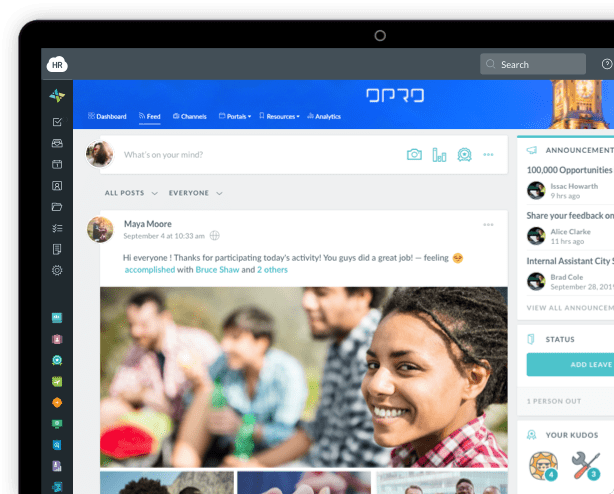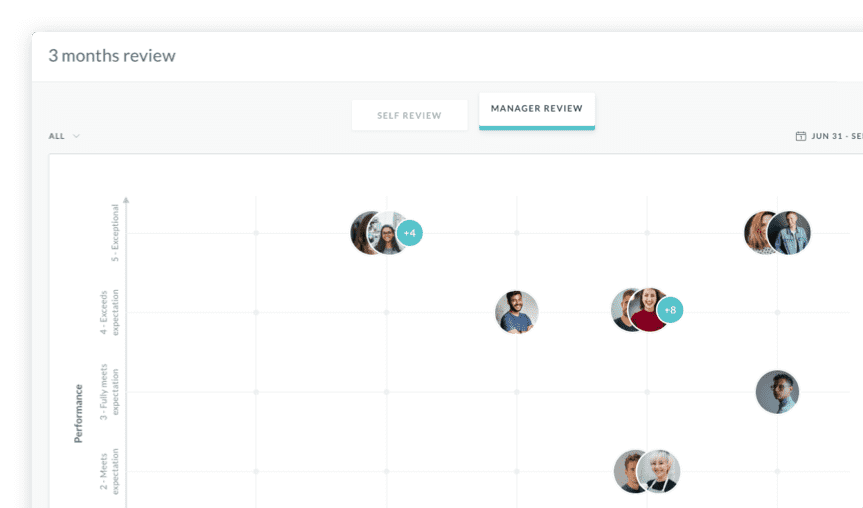

 Cut onboarding time
by 60%—here's the
Ultimate Checklist
that helped do it.
Cut onboarding time
by 60%—here's the
Ultimate Checklist
that helped do it.

Working as a team is essential in any large or small business. You need your employees and colleagues to build trust, enjoy open and honest communication, and work together to achieve team goals. Without this, your business won’t be able to run properly and will have no chance of growing or improving.
The secret to long-term success is largely about ensuring you're hiring the right people for the right job. However, this is not where building a successful business stops.
You need to consider how that team works together. Sometimes, the perfect person for a position may not be the most experienced, or the one with the best qualifications. Instead, they might be the person who works better in a team.

The Importance Of Team Cohesion
In a nutshell, team cohesion is when a group of individuals works together for the common good. In a business context, this means completing projects or improving processes to boost the bottom line. In a perfect world, each team member will bring their individual skill set to the table, and those skill sets will work in harmony to reach the goal.
Without a cohesive bond and working strategy within a company, the business will never operate as effectively or as efficiently as it could. Not only is this bad for your bottom line, but it’s also bad for your employees’ well-being.
The figure for disengaged employees is usually around 70%, and that is not good for business. There are a lot of reasons for disengagement—stress in the workplace, bad fit for the job, low morale or motivation, poor management—but lack of team spirit is a big one.
How To Build Team Cohesion
Thankfully, there are plenty of things that you can do to improve this statistic in your business. It takes effort from both you as the leader and the team members themselves. However, if team leaders play an active role in building camaraderie and offering the right motivation, you can all improve team efficiency and still feel comfortable.

1. Define Your Company Values
Even a startup or small business should have a mission statement and a set of company values. These are critical for steering your business in the direction you want to grow. And they will help you find the right people to build a successful team. With a fully established set of values, you can give your team a strong sense of what they are working towards. This immediately gives all team members a common thread that unites them.
If you don’t already have a vision and mission statement, you can include your team in creating one or incorporate team collaboration software to improve your internal communication plan. This will help them build trust and give them an even greater sense of group cohesion. They become part of creating common goals and ways of thinking.
2. Establish The Rules
All great teams need a clear set of rules to play by. If everyone knows the rules, then it makes it a lot easier to work together and feel comfortable. These rules should include exactly who is responsible for what element of a project or ongoing work. Clearly defined team goals are important too. This sets up clear expectations for commitments from each member of the team. It also gives everyone an understanding of their role within the group.
It’s important to have accountability for everyone—from the leader of the team to the most junior staff member. Everyone will be able to see what they need to do and how that will impact what everyone else needs to do. Plus, you’re showing your team that you play an active role and are just as responsible if work is not completed on time.

3. Show Your Trust
Trust is a critical part of teamwork and building camaraderie. If colleagues can’t trust each other to get work done on time or do not appreciate the work that each member does, they will not work well together. This all starts from the top.
As the leader, you need to be sure that you are showing your team that you trust them and that they can trust you. Avoid micromanaging your team. Instead, build trust and create a culture of respect by showing that you believe in them and their abilities.
4. Establish Clear Lines Of Open & Honest Communication
Open and honest communication is another critical element of working towards team goals. The solution to improving company communication is that each member needs to feel comfortable enough to ask questions, give input, and share any grievances that arise. Plus, they need to feel that their voices will be heard and acknowledged.
When establishing your rules for teamwork, include a section on how the team should communicate. Try to be as transparent as possible so that no one feels like information is being hidden, or that someone is being excluded from any processes. Play an active role in ensuring communication is clear, and that there are no gray areas at any stage. This creates a feeling of group cohesion, as everyone has a strong sense of belonging and inclusion.
Social Intranet Software that Encourages Employee Communication

5. Ensure You Have Safe Practices
This comes down to accountability and open and honest communication once again. To build a successful team, you need each member to feel safe in their role and in their interactions with each other. When this happens, you have a great team that communicates and takes responsibility.
However, without safe practices for teamwork, people will not allow themselves to build trust in their teammates or you. It might seem obvious, but always try to criticize people in private, and praise efforts in public.
6. Learn About Each Other
Team-building activities may seem like a boring cliché, but it’s important in building camaraderie and getting people to work well together.
You don’t need to go out into the wild and spend a week doing an adventure boot camp. Team-building activities can be as simple as going for lunch together once a week so that you have some downtime together. This allows people to let their guards down and start talking to each other as friends, not as staff who need to always get a job done.
7. Celebrate Their Success
Keeping your team motivated is a key ingredient to group cohesion.
One of the best ways to do this is to celebrate their success in reaching those all-important team goals. Each time you finish a project, bring in donuts for the team and congratulate them all. At the end of the quarter or the year, celebrate your achievements in a way that suits your company. Whether this involves a shout-out on your company feed, a staff party, a group trip to a spa, or a shared experience everyone will enjoy, the aim is to ensure that every member of your team feels appreciated.
If you celebrate their success together, it will give the team a sense of pride in their efforts, helping them to feel motivated to work harder together.
You can also make a point of celebrating personal victories within your team. If someone has completed their studies, bought a house, or reached any other major milestone, use this as an opportunity to foster a strong sense of team spirit.

To learn even more about managing remote teams and keeping employees working at home highly engaged, download our ebook now.
Download nowTaking The First Steps Towards Cohesion
Building an engaged, motivated, and productive team isn't always easy, but it’s essential for any big or small business that wants to thrive in today’s marketplace.
If you want to build a great team, it’s as easy as taking the first step. Play an active role in creating group cohesion and don't assume it will come naturally. It takes time, effort, and open and honest communication.
Follow these seven tips to foster a spirit of togetherness that leads to a collaborative culture that breeds success.
Author Bio:
This article is written by our marketing team at HR Cloud. HR Cloud is a leading provider of HR solutions, including recruiting, onboarding, employee engagement, and intranet software. Our aim is to help your company improve employee engagement, employee productivity, and to save you valuable time!
Keep Reading
BambooHR vs HR Cloud: Which HRIS Actually Scales for Growing Companies?
TL;DR: BambooHR's apparent simplicity becomes a major limitation as companies scale past
The Hidden Metrics of Frontline Success: Beyond Engagement Scores
"What gets measured gets managed, but what gets measured well gets transformed." — Peter
Embracing Diversity: Recognizing Different Cultures in the Workplace
Workplaces today reflect the incredible diversity of the world around us. People bring
Like What You Hear?
We'd love to chat with you more about how HR Cloud® can support your business's HR needs. Book Your Free Demo

Build a Culture of Recognition. Boost Engagement. Guaranteed.
Workmates empowers employees to stay informed, connected, and appreciated—whether they’re on the front line, in the office, or remote. Recognition drives 12x higher engagement.Trusted by industry leaders in every sector




Cut Onboarding Costs by 60%.
Take the confusion and follow-ups out of onboarding with automated workflows, digital forms, and structured portals—so new hires ramp faster 3X quicker.Trusted by industry leaders in every sector







